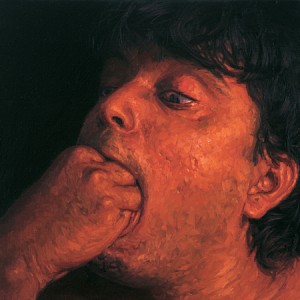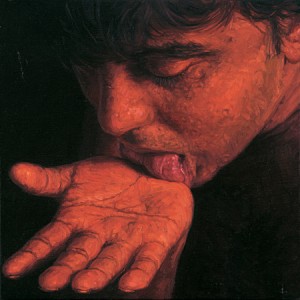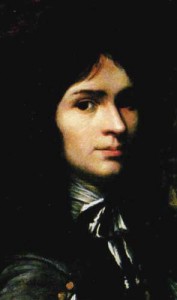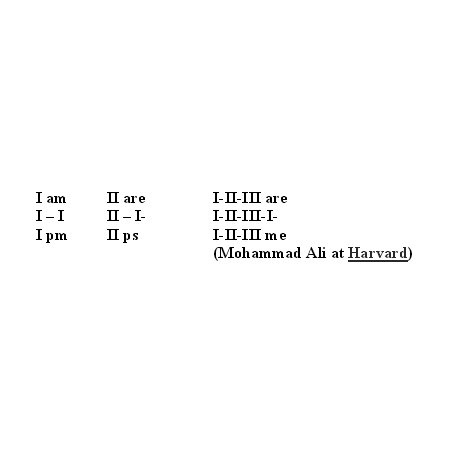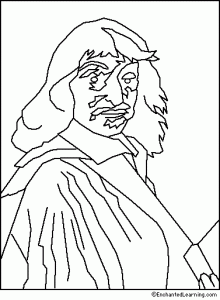Author Archive
Descartes` and Karmakars` challenging tongues III
Tuesday, November 18th, 2008To what kind of intuition are we invited by Karmakar?
What are we asked to do? In analogy to the Cartesian formular we are invited to perform something. Does Karmakar want us to use our tongue and to start licking, caressing, eating ourselves in the way we see on his images?
Descartes and Karmakar share something. Descartes presents himself as gentle, calm author who is aware of its own limits, his limits of reasoning and knowing truths. Descartes writes elegantly that he does not want to convince, but that he invites to intuit his argumentations. Descartes calls his text a fable, a fiction and a painting. Karmarkar shares this elegance. He paints himself, he writes about himself, and invites to look at his images. He does not say or show more or less, just himself or a representation of himself.
Markus Stegmann: Nur hebe
Tuesday, November 18th, 2008Vater, dass sie Schlammseife lassen, dass Witterung, sprich Hast aus Marken, anheften, Klavier, Kimme, Kanone ins – Masern hat es aus blosser Asche – Wohnschlafen einbrechen. Ach, es hat langlose Gesichter. Mager, als Arme mit Flanierpapier farbiglos macht nichts als Schleppe regelrecht, die angelockten Reifen verfärben unsre Augen. Vater, die sind so leicht für sich, die gehen schlafend nieder, dass sie, wie ich Herbst, Tapete soll aussprechen, nicht weiss, wohin im Sinn, im Flimmern. Nur die Schnur davon. Muss, dass wir andenken. Dass wir allein als Beet uns legen. Ihn schürft das Kornbrot. Baracke, Vater das ist höchstens eine Klavierschlinge mit Pastillen, als breche ich ausgewöhnte Brote vom Arm, an die, weisst du, Weder-Wand hätte nicht widersprochen. Nicht fechten. Nur hebe als Arm, ich halte an seine Schnur.
Abir Karmakar: I Love Therefore I am
Monday, November 17th, 2008Intuition: On Descartes` and Karmakars` challenging tongues
Monday, November 17th, 2008Descartes approach is in certain sense intuitive. When Descartes writes: “I am thinking, therefore I am being” he invites the reader to think this through, to get an intuition of the truth of this sentence.
Intuition in Descartes`sense demands that the reader starts to perform the same reasoning that Descartes proposes. Descartes was convincend that there are universal truths, which everybody can intuit. Descartes was convinced that there is a light of reason, which can start to shine in everybody. Therefore everybody can agree by intuition to the conclusions Descartes draws?
To which intuition are we invited by Karmakars images? To which intuition are we invited by Karmakar who writes the following title: I am loving, therefore I am being?
Nils Röller New Delhi/Sanskriti Kendra
Descartes: I, convinced that I was as open to error as any other …
Monday, November 17th, 2008Descartes: Copper and Diamonds
Monday, November 10th, 2008After all, it is possible I may be mistaken; and it is but a little copper and glass, perhaps, that I take for gold and diamonds. I know how very liable we are to delusion in what relates to ourselves, and also how much the judgments of our friends are to be suspected when given in our favour. Descartes: Discourse on Method.
Descartes` and Karmakars` challenging tongues I
Sunday, November 9th, 2008Karmkars paintings show a tongue, a huge tongue which licks and caresses, sucks parts of a body. It is a self affecting tongue, a tongue which explores and worships and nearly eats parts of the body to which it belongs.
The title “I love therefore I am” invites to relate this tongue to loving and being. But Karmakar is not writing about his tongue and the body belonging to this tongue. Karmakar paints something which stands not in a direct logical chain of reasoning with this words.
Therefore the title serves as an uncanny invitation. It invites not to reason according to linguistic paths, but to follow the gaze towards strange moments, towards somebody `s affection of or for himself.
Nils Röller New Delhi/Sanskriti Kendra

